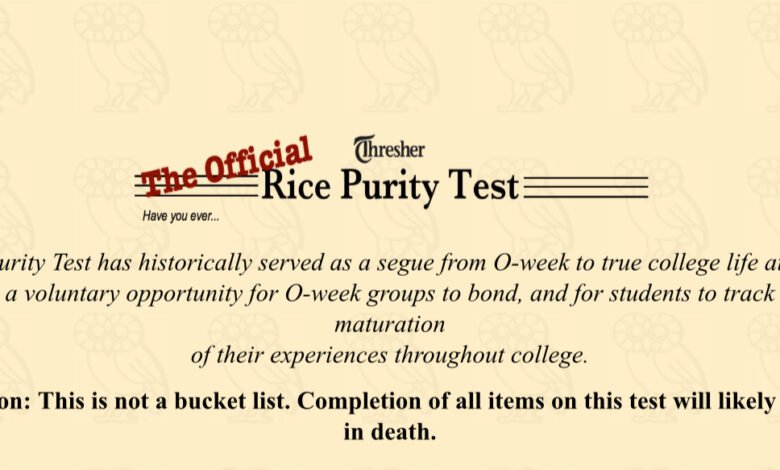Rice Purity Test A Comprehensive Guide

Introduction
The Rice Purity Test has become a popular cultural benchmark among young adults, especially in university settings. This self-assessment tool, consisting of 100 questions, serves as an informal gauge of a person’s innocence or experience across various aspects of life. This article delves into the origins, structure, significance, and cultural impact of the Rice Purity Test.
What is the Rice Purity Test?
The Rice Purity Test is a survey designed to measure an individual’s exposure to different activities and behaviors. The test includes questions about personal habits, relationships, substance use, and other experiences, providing a “purity” score based on the responses.
Origin and Evolution
The Rice Purity Test was created at Rice University in Houston, Texas. Initially, it served as a social icebreaker among students, fostering camaraderie and open discussion about personal experiences. Over time, the test spread beyond the university, gaining widespread popularity on the internet.
Purpose and Popularity
The primary purpose of the Rice Purity Test is to offer a fun and informal way for individuals to reflect on their life experiences. It has become particularly popular among college students, often used during orientation activities or social gatherings to encourage bonding and discussion.
Structure of the Rice Purity Test
The Rice Purity Test consists of 100 yes-or-no questions, each addressing a specific experience or behavior. These questions can be categorized into several main themes.
Categories of Questions
Personal Behavior
Questions in this category focus on daily habits and personal care routines, such as maintaining hygiene and managing sleep patterns.
Relationships and Intimacy
This section includes questions about romantic and sexual experiences, ranging from first kisses to more intimate encounters.
Substance Use
Questions related to the use of alcohol, tobacco, and other drugs fall under this category, covering both legal and illegal substances.
Legal and Ethical Conduct
This category assesses involvement in illegal activities or behaviors that are generally considered unethical or socially unacceptable.
Miscellaneous Experiences
A variety of other experiences, such as attending large events, traveling, or participating in certain social activities, are covered in this section.
Scoring System
Each “Yes” answer corresponds to a specific experience, indicating a departure from “purity.” The total number of “Yes” answers is subtracted from 100 to determine the final purity score. A higher score suggests greater innocence, while a lower score indicates more life experiences.
Significance of the Rice Purity Test
Social Bonding and Icebreaking
One of the key reasons for the Rice Purity Test’s popularity is its role in social bonding. Taking the test in a group setting often leads to discussions about shared experiences and personal stories, helping individuals to connect on a deeper level.
Self-Reflection
The Rice Purity Test also encourages self-reflection, allowing individuals to consider how their past experiences have shaped their present selves. It can be a revealing exercise that prompts introspection and personal growth.
Entertainment and Curiosity
Beyond its reflective and social aspects, the Rice Purity Test is simply entertaining. Many people take the test out of curiosity, eager to see how their experiences compare to those of their peers.
Cultural Impact and Controversies
Internet Phenomenon
The Rice Purity Test has become a widely recognized cultural phenomenon, particularly in online communities. Its popularity on social media platforms has contributed to its enduring presence and widespread appeal.
Criticisms and Concerns
Despite its popularity, the Rice Purity Test has faced criticism and raised several concerns.
Privacy Issues
Given the personal nature of the questions, some participants may feel uncomfortable sharing their responses. This can lead to concerns about privacy, especially if the test results are shared in a group setting.
Reinforcement of Stereotypes
Some critics argue that the Rice Purity Test reinforces stereotypes and societal expectations about behavior. The focus on certain experiences may perpetuate narrow views of what constitutes a “normal” or “acceptable” lifestyle.
Lack of Scientific Basis
The Rice Purity Test is not scientifically validated, and its results are purely anecdotal. The scoring system is arbitrary, and the questions are not standardized, making the test a subjective measure rather than an objective assessment of purity or experience.
How to Take the Rice Purity Test
Finding the Test
The Rice Purity Test is widely available online. Numerous websites host the test, making it easily accessible to anyone interested in taking it.
Interpreting the Results
Interpreting the results of the Rice Purity Test is straightforward. A higher score indicates greater purity, while a lower score suggests more life experiences. It’s important to remember that the test is meant to be a fun and informal exercise, not a definitive judgment of one’s character.
Sharing and Discussing
Many people choose to share their scores with friends or on social media. This can lead to interesting discussions and a better understanding of each other’s experiences. However, it’s essential to approach these conversations with sensitivity and respect for privacy.
Conclusion
The Rice Purity Test offers a unique and engaging way to reflect on one’s life experiences. Whether taken for fun, self-reflection, or social bonding, it has become a notable part of contemporary youth culture. Despite its criticisms, the test continues to captivate the curiosity of people around the world, providing a light-hearted glimpse into the diverse experiences that shape our lives.
FAQs
What is the Rice Purity Test?
The Rice Purity Test is a 100-question survey designed to assess a person’s level of innocence or experience across various aspects of life.
Where did the Ricce Purity Test originate?
The test originated at Rice University in Houston, Texas, as a social icebreaker among students.
How is the Ricee Purity Test scored?
Each “Yes” answer indicates an experience, and the total number of “Yes” answers is subtracted from 100 to determine the final purity score.
Is the Rice Purity Test scientifically valid?
No, the Rice Purity Test is not scientifically validated. It is a subjective and informal measure of a person’s experiences.
Why do people take the Rice Purity Teest?
People take the test for various reasons, including curiosity, self-reflection, social bonding, and entertainment.



